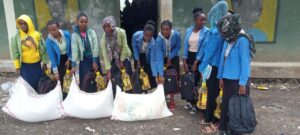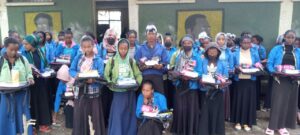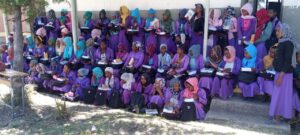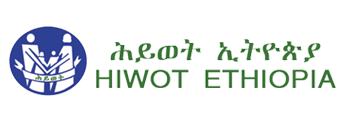There are various factors affecting educational opportunities for girls. Deeply rooted customs, belief systems and attitudes practiced in families and communities, coupled with poverty and lack of awareness are seen as the main barriers for girls to complete their secondary education. Moreover, socio-cultural factors such as social norms and traditional practices about the role and position of girls and women in Ethiopian society, gender-based violence, early marriage and teenage pregnancy, are affecting girls’ access and completion of their secondary school.
The Educating Girls for a Better Future project is designed to create a safe school environment for girls in secondary school and quality education by mitigating barriers to girls’ education. It also aims to bring about policy and social norm changes through advocacy, raising public awareness, strengthening the capacity of local communities, and engaging zonal, regional, and national-level duty bearers to ensure quality education. Overall, the project anticipates an impact that helps girls get quality education, create a girls’ friendly school environment, and have strong, accountable systems that will enable all vulnerable girls to access schools and quality learning opportunities. Particularly, the project also aspires to and asks for the development and implementation of the Girls Friendly Safe School Environment Act, and the existing education quality standards will be revised for gender responsiveness and inclusiveness of girls’ needs and interests.
The Overall Objective: The overall objective of this project is to contribute to quality education and supportive social and cultural norms for girls to complete secondary school successfully. The project is financed by the Malala Fund for three years (April 2020–March 2023) to be implemented at six secondary schools found in the North Shewa Zone of the Amhara region.This article mentions your favorite hats at super low prices. Choose from same-day delivery, drive-up delivery or order pickup.
Address critical humanitarian concerns
Because of the ongoing conflicts and other economic factors, girls, particularly those from economically poor families, are directly affected and forced to be absent from school. Therefore, Hiwot, in close consultation with the Malala Fund, Debre Berhan City administration, Siyadebir Wayu woreda women, children, social affairs, education office, and the six secondary school representatives, procured and distributed food and non-food items for six secondary school girls found in the Debre Berhan City administration and Siyadebir Wayu woreda, Northshewa Zone of the Amhara region. On this occasion, Hiwot distributed 6942 pieces of exercise books, 10680
pens, 5340 pens, and 534 bags for 534 girls. Distributed 720 kg of flavour powder, 720 kg of macaroni, and 432 litres of oil for 144 girls, as well as sanitary pads and soaps for 300 girls.
Hiwot Ethiopia would like to thank the Malala Fund for its commitment and for allowing the fund to support girls and their families.



